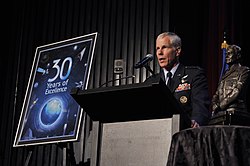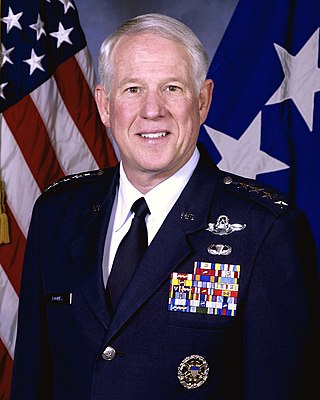
General William R. Looney III, USAF was the 28th Commander, Air Education and Training Command (AETC), Randolph Air Force Base, Texas. As commander, he was responsible for the recruiting, training and education of Air Force personnel. His command included the Air Force Recruiting Service, two numbered air forces and Air University. Air Education and Training Command consists of 13 bases, more than 66,000 active-duty members and 15,000 civilians. General Looney was succeeded by General Stephen R. Lorenz on July 2, 2008, and retired from the Air Force on August 1, 2008. Since his retirement from the Air Force, Looney has taken a position as a board member at Trident University International.

Claude Robert "Bob" Kehler, is a retired United States Air Force general who served as Commander, United States Strategic Command from January 28, 2011, to November 15, 2013. He previously served as Commander, Air Force Space Command from October 12, 2007, to January 5, 2011. As a commander of the Air Force Space Command, he was responsible for the development, acquisition and operation of the Air Force's space and missile systems. He oversaw a global network of satellite command and control, communications, missile warning and launch facilities, and ensured the combat readiness of America's intercontinental ballistic missile force. He led more than 39,700 space professionals in providing combat forces and capabilities to North American Aerospace Defense Command and U.S. Strategic Command. He was also responsible for the plans and operations for all U.S. forces conducting strategic deterrence and Department of Defense space and cyberspace operations. He officially retired from the Air Force on January 1, 2014, after nearly 39 years of service.

General Lance W. Lord is a retired four-star general in the United States Air Force who served as Commander of Air Force Space Command at Peterson Air Force Base in Colorado.

Donald Graham Cook is a retired United States Air Force four-star general who served as commander, Air Education and Training Command at Randolph Air Force Base, Texas from 2001 to 2005.

Retired Maj. Gen. Roosevelt Mercer Jr., SES, is the director of the Interagency Planning Office (IPO) for the Next Generation Air Transportation System (NextGen) at the Federal Aviation Administration where he provides high-level leadership for interagency and international collaboration related to NextGen. He executes the collaborative processes needed to ensure efficient coordination among all federal partners whose decisions impact NextGen. The federal partner agencies include the National Aeronautics and Space Administration (NASA), Department of Defense (DoD), Department of Homeland Security (DHS), Department of Commerce (DOC), National Transportation Safety Board (NTSB), National Science Foundation (NSF), and Federal Aviation Administration (FAA), as well as the White House Office of Science and Technology Policy (OSTP) and the Office of the Director of National Intelligence (ODNI) as an ex officio participant. Mr. Mercer is charged with providing executive direction to a dynamic multi-agency and international partnering organization focused on future NextGen technology, policy, and collaborative activities.
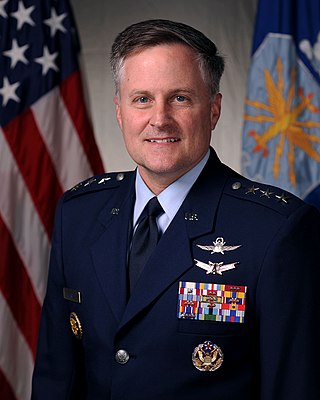
William T. Lord was the Chief of Warfighting Integration and Chief Information Officer, Office of the Secretary of the Air Force, the Pentagon, Washington, D.C. Prior to his retirement, General Lord led five directorates and two field operating agencies consisting of more than 1,000 military, civilian and contractor personnel supporting a portfolio valued at $17 billion. He integrated Air Force warfighting and mission support capabilities by networking space, air and terrestrial assets. Additionally, he shaped doctrine, strategy, and policy for all communications and information activities while driving standards and governance, innovation, and architectures for information systems and personnel.

Frank Graham Klotz served as Under Secretary of Energy for Nuclear Security and Administrator for the National Nuclear Security Administration of the U.S. Department of Energy. He was confirmed for the position on April 8, 2014, and retired on January 20, 2018.
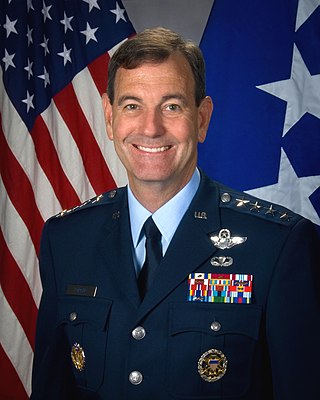
Stephen Randolph Lorenz, is a retired United States Air Force four-star general who currently serves as president and chief executive officer of the United States Air Force Academy Endowment. His last military assignment was as the 29th Commander, Air Education and Training Command (AETC), Randolph Air Force Base, Texas. As commander, he was responsible for the recruiting, training and education of all US Airmen. His command included the Air Force Recruiting Service, two numbered air forces and Air University. Air Education and Training Command consists of 13 bases, more than 92,000 active duty, reserve, guard, civilians and contractors, and 1,750 trainer, fighter and mobility aircraft.

Lieutenant Colonel Eric D. Brown is a former commander of the 320th Missile Squadron at F.E. Warren Air Force Base, Wyoming.

Teresa A.H. Djuric is a retired United States Air Force brigadier general. Her last assignment was deputy director, Space and Intelligence Office, Office of the Under Secretary of Defense for Acquisition, Technology and Logistics, The Pentagon, Washington, D.C.

Sandra E. Finan was the Deputy Chief Information Officer for Command, Control, Communications and Computers (C4) and Information Infrastructure Capabilities, Office of the Secretary of Defense, Pentagon, Washington D.C.

Major General Robert Alan "Rosie" Rosenberg of United States Air Force was Director of Defense Mapping Agency from July 1985 to September 1987. Throughout his 30-year career with the U.S. Air Force, he was instrumental to the U.S. satellite program. National Geospatial-Intelligence Agency inducted him into its Hall of Fame in 2005.

David Dean Thompson is a retired United States Space Force general who served as the first vice chief of space operations from 2020 to 2023. He served as the vice commander of the Air Force Space Command from 2018 to 2020.

John Edwin Shaw is a retired United States Space Force lieutenant general who last served as the deputy commander of the United States Space Command from 2020 to 2023. He previously served as commander of the Combined Force Space Component Command and deputy commander of Space Operations Command.

Christopher Stephen Povak is a United States Space Force major general who serves as the deputy director of the National Reconnaissance Office and commander of the Space Force Element to the National Reconnaissance Office. He previously served as the deputy director of the Space Warfighting Analysis Center.
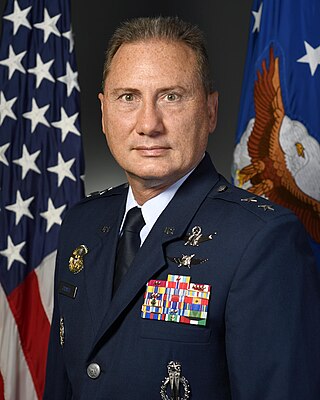
Clinton E. Crosier is a retired United States Air Force major general who last served as director of space force planning in the Office of the Chief of Space Operations. After retiring, he was hired to lead Amazon Web Services' new Aerospace and Satellite Solutions.

David Wayne Allvin is a United States Air Force four-star general who has served as the 23rd chief of staff of the Air Force since November 2, 2023. He most recently served as the 40th vice chief of staff of the Air Force from November 2020 to November 2023, and as acting chief of staff of the Air Force from September to November 2023.

Lieutenant General Salvatore A. "Sam" Angelella is a retired United States Air Force officer who last served as commander, United States Forces Japan and commander, 5th Air Force from July 2012 to August 2015. During that assignment, Angelella was the senior United States military representative in Japan and commander of United States Air Force units in Japan.
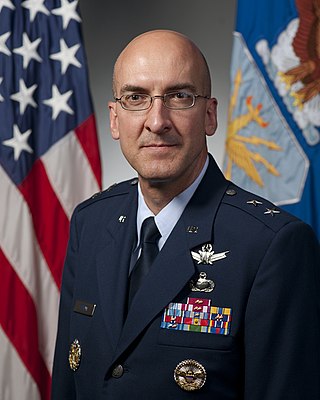
Terrence (Terry) Feehan is a retired major general in the United States Air Force and was the Director of Strategic Plans and Requirements, Headquarters Air Force Space Command, Peterson Air Force Base, Colorado. In that role he was responsible for developing strategy, doctrine and policy for the command's space and cyberspace operations. After his military retirement, he became a vice president at Northrop Grumman where he directed a variety of staff functions and served as a major program director.

Matthew Scott Cantore is a United States Space Force brigadier general who served as the first commander of Space Delta 2 from 2019 to 2021. He now serves as the deputy commander of Space Training and Readiness Command.

